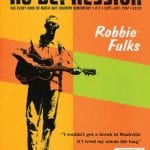Clodhopper – Old-school American Music
Late last summer, Clodhopper visited the Tractor Tavern in Seattle to open for the Red House Painters. My lasting impression turned out not to be from he headliner, but rather the opening act, which energized the crowd with their take on old-timey mountain songs and their quietly personal originals.
Clodhopper’s leader, singing and trading lead parts between mandolin and clawhammer banjo, is Danny Pearson, the former bassist for American Music Club. His instrumental contributions, when layered over the bed of fuzzy chords laid down by guitarist Tim Bierman, create a peculiar and satisfying buzz that defines the Clodhopper sound.
Fast forward to the spring of ’97. Clodhopper is back in Seattle, and we meet over dinner a few hours before they headline an evening of roots/country music at the Tractor. Pearson and Bierman and joined by another AMC alumnus, drummer Tim Mooney. Bierman explains that they “have revolving bassists” and that, on this night, the duties will be handled by part-time Missoula resident Jeff Ament, who’s also in some other Seattle band a few people have heard of.
Pearson says Clodhopper’s music is “closer to old-school front porch music than it is to most Gram Parsons-influenced alternative country.” These guys have a true appreciation for IWW labor songs and old-time Appalachian folk songs. “If the old-timers had electric guitars,” Bierman observes, “maybe this is what they would have sounded like.” As a reference point, Bierman recommends a CD of field recordings on Rounder called High Atmosphere: Ballads and Banjo Tunes from Virginia and North Carolina. While Clodhopper’s sound is very different from this remarkable collection, there is an unmistakable link.
On the band’s demo tapes (as yet unreleased), this link is strengthened by several traditional songs, including “900 Miles”, “Dinah”, “Little Rabbit”, “Drowsy Sleepers” and “Moonshiner”. Clodhopper performs “Moonshiner” in a nearly a cappella arrangement, Pearson mournfully wailing out each line over a series of fuzzy, sustained guitar chords. It’s barely recognizable as the same song Uncle Tupelo did on March 16-20, but it’s more effective and haunting.
Pearson and Bierman are thinking of spending some time in San Francisco (where Mooney lives) and dedicating more time to the band. Pearson says he wants to “finish some tracks, look for a label, play whenever possible, and try not to force the issue.”
Later that night, Clodhopper takes the stage at the Tractor again, and it’s clear that some people don’t know what to make of the band. Haven’t they ever seen a solid-body electric Rickenbacker mandolin played through a wah-wah before? But Clodhopper doesn’t force the issue: The performance is dynamic, and the crowd gets fully involved after a few songs. By the time they’ve closed the set with “Moonshiner”, everyone is wanting more.




